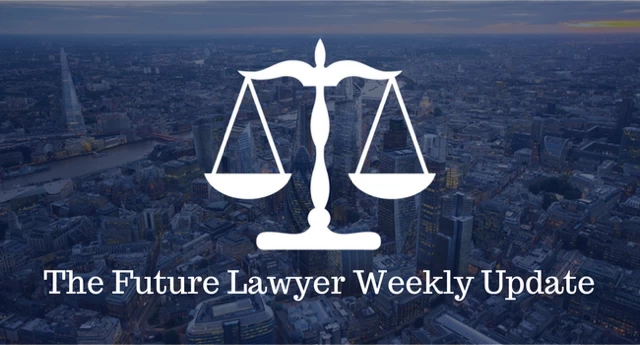
Clear the Lobby: What laws are MPs voting on this week (w/c 27th April)?
April 27, 2020
The Coronavirus Act 2020: how it affects everyone
April 28, 2020The round-up of the stories that a budding Student Lawyer should be aware of this week. Sign up here to get these updates in your inbox every week.
Criminal Law: Blasphemy
Scottish Hate Bill Crime
Reported by Ellena Mottram
A new Scottish hate crime bill is to decriminalize blasphemy, over 175 years after the last case of blasphemy.
Under Scottish law, blasphemy is a criminal offense under hate crime laws. Whilst no individual has been prosecuted for the offense since 1842, it remains a criminal offense punishable by fine, imprisonment or both.
The administration in Edinburgh has said that to continue with blasphemy as a crime would “no longer reflect the kind of society in which we live”. The bill was introduced by the nation’s Parliament on the 23rd April, and if passed will mean Scotland will become the ninth country in the world to abolish blasphemy as an offense since Humanist International began the campaign.
The move to decriminalize blasphemy follows the same decision being taken in a range of countries including Ireland, Greece, Denmark and Canada. The move has also been welcomed by Humanists UK which has been campaigning for the law to be addressed since 2015. They argued that repealing the law show solidarity ‘with the victims of oppressive blasphemy laws around the world’.
The move comes after blasphemy was decriminalized in England and Wales which took place in 2008.
In addition to this change, the law will also introduce wide protection against race, sex, age and religious discrimination. If passed the bill will make “stirring up of hatred” apply to all the protected characteristics as at present it extends only to race.
Humza Yousaf, the Justice Secretary, highlighted that “Stirring up of hatred can contribute to a social atmosphere in which discrimination is accepted as normal”.
The hate law crimes currently protect on the basis of race, religion, disability, sexual orientation or for the victim’s transgender status. Whilst gender will not initially be included under the new proposals it has been said that a working group will be set up “at the earliest date possible” to look at creating a specific offense for misogynistic harassment.
Singapore’s Court of Appeal: Breach of Confidence
Singapore Court of Appeal modifies breach of confidence test
Reported by Laurence Tsai
The Singapore Court of Appeal recently modified the English case which established the elements of confidentiality to be in line with modern day technological advances, enabling wrongdoers to access confidential information from owners without their knowledge.
The elements of confidential as decided in the case of Coco v AN Clark (Engineers) Ltd are:
(a) Did the information have the necessary quality of confidence about it?
(b) Was the information imparted in circumstances importing an obligation of confidence?
(c) Was there any unauthorized use of the information to the detriment of the party from whom the information originated?
The Singapore Court modified the test in the case of I-Admin (Singapore) Pte Ltd v Hong Ying Ting and others.
The appellant brought claims for copyright infringement and acts in breach of confidence against former employees who incorporated a rival company (“the respondents”). The respondents were found to be in possession of several materials owned by the appellant, including its source codes, databases, business development and client-related materials, and materials related to its operations.
The High Court judge held that there was no copyright infringement as the respondents did not copy a substantial part of the confidential material. The judge also held that the appellant failed to satisfy the third limb of the Coco test because there was no use of the appellant’s confidential information.
On appeal, the Court of Appeal affirmed that there was no copyright infringement. In response to the claim of breach of confidence, the Court identified two of the appellant’s interests which were to be protected:
i. To prevent the wrongful gain or profit from its confidential information (“wrongful gain interest”);
and
ii. To avoid wrongful loss, which was the loss occasioned to a plaintiff whose information had lost its confidential character or had that character threatened by the unconscionable acts of a defendant (“wrongful loss interest”)
The Court opined that the current law did not sufficiently protect the wrongful loss interest. It reasoned that protecting wrongful loss has greater importance as technological advances renders it easier for wrongdoers to access, copy and disseminate confidential information without the owner’s knowledge. That the Respondents did not use or disclose the information did not detract from the fact that “their actions compromise the confidentiality of the information in question”.
To that end, the Court took a modified approach to the Coco test in assessing breach of confidence claims:
(a) In line with the first two requirements of Coco, a court must consider whether (i) the relevant information had the necessary quality of confidence about it, and (ii) if it was imparted in circumstances importing an obligation of confidence. Upon satisfaction of these requirements, there is presumed to be an action of breach of confidence (in other words, a potential claimant need now only prove the first two limbs of Coco).
(b) The defendant has the burden of displacing this presumption by proving to the court that its conscience was not adversely affected by its dealing with the confidential information.
The Court was not satisfied that the respondents had displaced the presumption and found that the respondents’ consciences were adversely affected and so had acted in breach of confidence.
This modified approach is likely to be welcomed by owners of confidential information as a potential claim can now be found where the owner does not know that its information was accessed or acquired. The judgement provides additional safeguards for owners in this digital age, particularly due to the occurrence of cyberattacks. By shifting the burden to the defendant to show that its conscience was not negatively affected, this new approach places greater weight on a defendant’s conduct and motives behind accessing such information and addresses the evidential difficulties faced by the owners of confidential information in bringing a claim in confidence. It is hoped that other jurisdictions will follow suit and rely on the Court’s approach in reviewing new cases concerning confidential information.
You can find more here or here.
Euthanasia
Euthanasia case: Dutch court approves it in cases of advanced dementia
Reported by Emma Ducroix
Doctors in the Netherlands are able to carry out euthanasia on patients with severe dementia without fear of prosecution even if the patient no longer expresses an explicit wish to die.
But it would have to be under the strict rules for euthanasia, including that the patient must have “unbearable and endless suffering” and that at least two doctors must have agreed to carry out the procedure. The patient must also have requested euthanasia before they could “no longer express their will as a result of advanced dementia”.
The supreme court’s decision followed a landmark case last year in which a doctor was acquitted of wrongdoing for euthanising a woman in 2016 with severe Alzheimer’s who had requested the procedure before her condition deteriorated.
The case caused controversy in the Netherlands because the woman had to be restrained by her family as she was euthanised, having been given a sedative in her coffee beforehand. Prosecutors accused the doctor of going through with the euthanasia without properly consulting her client, saying the 74-year-old woman might have changed her mind about dying.
Lower Dutch courts acquitted the doctor of wrongdoing and prosecutors dropped the charges. The case was referred to the supreme court for a legal clarification “in the interest of the law”. The Hague-based court ruled: “A physician may carry out a written request beforehand for euthanasia in people with advanced dementia.”
The case was seen as an important test of the law in the Netherlands, which legalized euthanasia in 2002, followed shortly afterwards by neighboring Belgium. Ruling means doctors cannot be prosecuted even if patient no longer says they want to die.
The verdict underscored similar judgments in the lower courts, which also agreed that the 64-year-old doctor followed the correct procedures prescribed by the government.
You can find more here or here.
Cyprus Assault Survivor
Cypriot police investigation into alleged mistreatment in the gang rape case of a British teenager
Reported by Emma Ducroix
Overnight, a woman, 19, who was diagnosed with severe post-traumatic stress disorder, was turned from victim to suspect. She spent more than four weeks in Nicosia general prison, and on her release had to remain on the island for court proceedings that would drag on for the next five months.
In January, a judge sitting in Paralimni, found her guilty of fabricating the rape claim and sentenced her to four months in prison, suspended for three years, for the crime of fomenting public mischief.
The tourist, who recounted her ordeal in an ITV documentary broadcast on 14 April, maintained she was gang-raped last summer. She described how she had panic attacks before police coerced her into signing a confession that she had fabricated the assault. “There was no other way out of that police station other than [to] sign that retraction statement,” the woman, who remains anonymous and was referred to as Emily in the programme, said.
Within hours of her revoking the accusation the alleged assailants were allowed to fly home.
With the ITV documentary again putting the case in the news, Greek Cypriot police rebutted suggestions of improper conduct, saying all the officers involved had not only followed the right procedures but had been exonerated in court.
The Briton is taking her case to Cyprus’s supreme court, but her case is expected to be substantially delayed because of the coronavirus pandemic. The Derbyshire student has vowed to go all the way to the European court of human rights, if need be, with activists saying the case has highlighted the problem of rape – and women frequently not being believed by authorities when they report it – and the trauma associated with sexual assault.
Zelia Gregoriou, who teaches gender politics at the University of Cyprus, said. “We will all be there supporting her again. Ours is a dragon that doesn’t want to sleep, it is very much awake and it wants justice.”
You can find more here.




